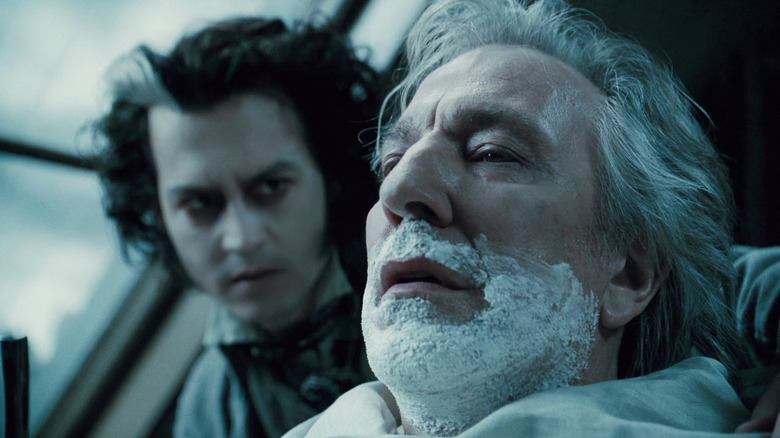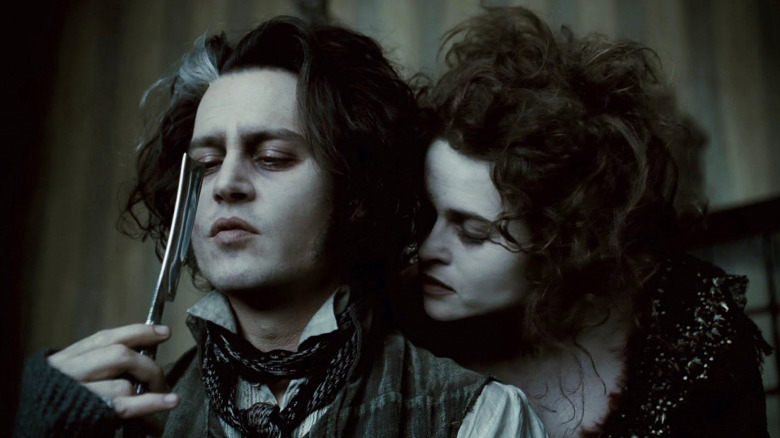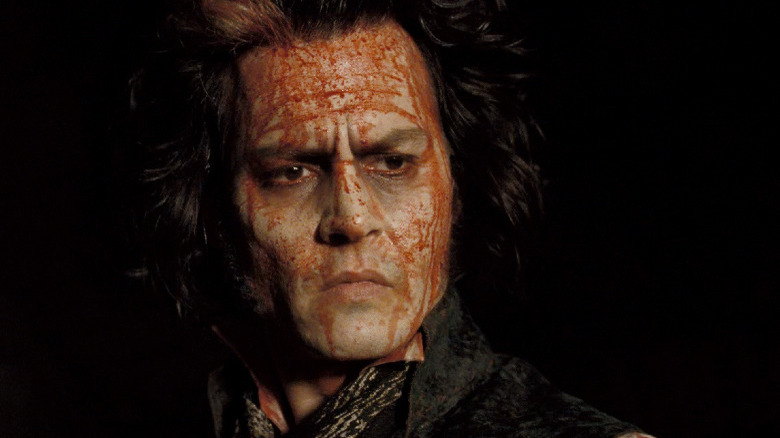Tim Burton Didn't Want Sweeney Todd To Shy Away From Being A Bloody, R-Rated Musical
Film musicals, as odd as it sounds, were once the superhero movies of Hollywood. In fact, they were more than that. On top of being money-makers, musicals were catnip for Academy Award voters up until the genre's decline in popularity in the 1970s. Thanks to "Moulin Rouge!" in 2001, musicals enjoyed a resurgence in the aughts, with "Chicago" winning the Best Picture Oscar just one year later. But after financial misfires like "Rent" and "The Producers," the genre was back on the naughty list by the time Tim Burton's "Sweeney Todd: The Demon Barber of Fleet Street" arrived in 2007.
Adapted from Stephen Sondheim and Hugh Wheeler's revered 1979 stage musical of the same name, "Sweeney Todd" tells the grisly tale of the eponymous character (Johnny Depp), a Victorian-era English barber who is falsely convicted of a crime he didn't commit. Seeking revenge against the magistrate behind his sentence (Alan Rickman's Judge Turpin, a corrupt official who had a lust for his wife), Mr. Todd spends his days preparing to kill the judge by slashing his customers' throats and turning their bodies into meat pies with the aid of his accomplice, the love-struck baker Mrs. Lovett (Helena Bonham Carter). Spoiler: This nasty melodrama does not end well for anyone.
The "Sweeney Todd" stage show is very much a knowing homage to the Grand Guignol theater tradition, with blood spraying all about from the throats of Mr. Todd's victims. (The only thing sharper than the barber's shaving razors is the musical's social satire.) For Burton, it was all the more essential this element be carried over into the big screen adaptation, even if it meant the marketing team had to get a little creative with they way they promoted the film to those unfamiliar with the source material.
'It is always a risk'
It's a bit of a cliché to bring this up, but for as long as R-rated films have existed, studios have viewed them as inherently riskier box office bets than those with lower ratings. Add in the uncertainty of being a movie musical coming out in the late aughts, and it's fair to say "Sweeney Todd" was seen as a commercial challenge prior to its release. Burton was well-aware of that, too, as he told the outlet Female. He went on to share an amusing anecdote about his first time seeing the original stage show:
"It is always a risk, of course. I remember when I first saw the show in London, back when I was still a student basically. I didn't know anything about the musical and I remember seeing the show ... These two very proper British ladies were sitting in front of me chatting throughout the show, and then [the musical number 'Johanna (Quartet)'] came up, and blood starts squirting across the stage. They both stopped and paused for a minute, and one lady leaned over to the other and said, 'Is that really necessary?'"
Continuing on, Burton talked about the stage musical's roots in "those old Grand Guignol horror theater melodramas" and how the movie version would have lost something had it tried to tone the violence down. If anything, he felt the unrealistic nature of the film's bloodshed made it go over easier with studio executives. "It is more of an emotional release then it is a reality thing in this movie, and the studio was cool about it, and they accepted it because they knew what the show was," he added.
Some tricky trailer editing
Undoubtedly, it probably helped that when Burton made "Sweeney Todd," he was fresh off directing 2005's "Charlie and the Chocolate Factory," his highest-grossing film at that time. "People have said to me, 'You either have a lot of confidence or you're completely insane,'" he told Esquire in 2007. "In the case of 'Sweeney Todd,' we made an R-rated musical. I mean, the very term musical strikes fear in the hearts of studio executives," he added.
But where studio executives knew all-too-well what they were getting into with "Sweeney Todd," certain members of the public apparently did not. For as much as its trailers alluded to the film's ample throat-slicing without actually showing it (thanks to some careful edits), they also went out of their way to conceal the fact the vast majority of the movie's dialogue is sung. According to an article published by The Guardian in 2008, this didn't go unnoticed at the time of the movie's release in theaters:
"Stung at paying to see a collection of tortuously constructed Stephen Sondheim tunes when they were expecting a gory Gothic thriller, a fair proportion of cinema audiences has been walking out of 'Sweeney Todd.' A complaint has even been made to the Advertising Standards Authority."
Musical theater lovers similarly walked away with mixed feelings about Burton's film, loving its stylishly morbid visuals but feeling its leads had failed to do justice by Sondheim's songs (which are famously tough for even trained Broadway singers to pull off). Still, in spite of this and whatever backlash "Sweeney Todd" suffered from its sleight-of-hand marketing, it wasn't enough to stop the movie from grossing over three times its $50 million budget at the global box office. Like Mrs. Lovett's pies, the film was simply too enticing to pass up.


